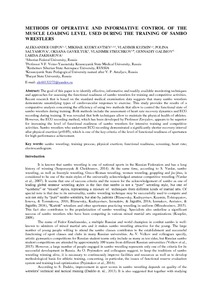Methods of operative and informative control of the muscle loading level used during the training of sambo wrestlers
Скачать файл:
URI (для ссылок/цитирований):
http://www.efsupit.ro/images/stories/nr4.2016/art198.pdfhttps://elib.sfu-kras.ru/handle/2311/70188
Автор:
Osipov, Aleksander
Kudryavtsev, Mikhail
Kuzmin, Vladimir
Salyamova, Polina
Gavrilyuk, Oksana
Struchkov, Vladimir
Galimov, Gennadiy
Zakharova, Larisa
Коллективный автор:
Институт физической культуры, спорта и туризма
Кафедра физической культуры
Дата:
2016-12Журнал:
Journal of Physical Education and SportКвартиль журнала в Scopus:
Q2Библиографическое описание:
Osipov, Aleksander. Methods of operative and informative control of the muscle loading level used during the training of sambo wrestlers [Текст] / Aleksander Osipov, Mikhail Kudryavtsev, Vladimir Kuzmin, Polina Salyamova, Oksana Gavrilyuk, Vladimir Struchkov, Gennadiy Galimov, Larisa Zakharova // Journal of Physical Education and Sport. — 2016. — Т. 4 (№ 4). — С. 1247-1252Аннотация:
The aim of this paper is to find out effective, informative and available monitoring techniques and ways of
assessment of sambo wrestlers’ functional readiness for training and competitive activity. Recent research based
on the standard medical examination data suggests that many sambo wrestlers demonstrate unsatisfying types of
cardiovascular response to exercise. The paper provides the results of a comparative analysis concerning the
efficiency of utilization of two methods that allow controlling the functional state of sportsmen in the training for
sambo wrestlers. These two methods include the assessment of heart rate recovery dynamics and ECG recording
during training. As it was revealed, both techniques allow maintaining athletes’ physical health. However, the
ECG recording method, developed by Professor Zavyalov, seems to work better to increase the level of sambo
wrestlers’ functional readiness for intensive training and competitive activity. Sambo wrestlers who underwent
ECG recording have demonstrated significantly less recovery interval after physical exertion (p<0.05), this being
one of the key criteria of the level of sportsmen’s functional readiness for high performance achievement.

